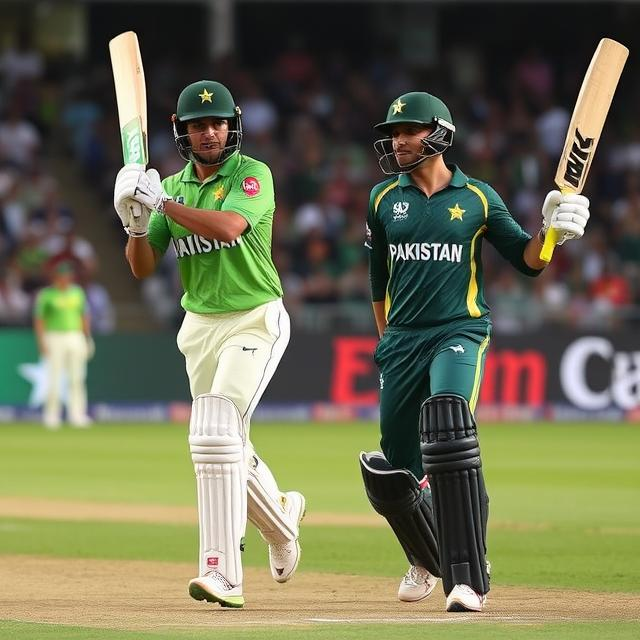Pakistan’s Hosting of Cricket World Cups: A Deep Dive
Pakistan’s Hosting of Cricket World Cups: A Deep Dive
Pakistan’s rich cricketing history is intertwined with its role as a host nation for the prestigious Cricket World Cup. From memorable victories to challenging circumstances, Pakistan’s experience hosting the tournament paints a vivid picture of the highs and lows of international cricket.
So, how many times has Pakistan hosted this global spectacle, and what have been the key highlights and controversies surrounding these events?

A History of Hosting
Pakistan has a relatively modest record as a host nation of the Cricket World Cup. Examining the details provides a richer understanding of its involvement.
- 1987: Pakistan co-hosted the Cricket World Cup with India and Sri Lanka. This edition marked a significant step for the nation in organizing a major international sporting event. The experience, while shared, laid the groundwork for future endeavours.
- 1996: Once again, Pakistan played a pivotal role in hosting the tournament, this time alongside India and Sri Lanka. This provided an opportunity to showcase its burgeoning cricketing infrastructure. Key matches were played across different venues, with each location adding its unique character to the overall experience.
- 2011: Pakistan, alongside India and Sri Lanka, played a critical role in hosting the 2011 Cricket World Cup. The nation was instrumental in delivering a well-managed and spectacular event. This experience further cemented its position as a reliable and capable host nation in international sporting events.
Beyond the Numbers: The Pakistani Experience
The hosting of the Cricket World Cup isn’t just about the number of times a nation has taken on the responsibility; it’s about the experience and the legacy that is built. Pakistan’s involvement has been both exhilarating and challenging.
The 1996 tournament, although successful, highlighted underlying infrastructure issues which needed addressing. While Pakistan has come a long way in subsequent years, the experience emphasized the importance of thorough planning and comprehensive preparation for such major events. The challenges of organizing such large-scale tournaments underscore the need for careful consideration of various factors, ranging from security concerns to logistical needs.

Cultural Significance
The Cricket World Cup is more than just a sporting event; it’s a cultural phenomenon. Pakistan’s hosting has played a role in showcasing Pakistani culture, hospitality, and enthusiasm for the sport to a global audience. This exposure fostered connections and understanding across nations.
Challenges and Controversies
Unfortunately, Pakistan’s hosting history isn’t without its challenges. Security concerns have sometimes cast a shadow over the events. These issues, while unfortunate, serve as important lessons for organizers in managing potential risks and ensuring the safety of all participants and spectators. The importance of preemptive measures and diligent planning in preventing and mitigating such concerns is vital for any future hosting events.
Another significant consideration is the political climate within the nation itself. External pressures can sometimes impact the smooth running of such events. Political stability is a crucial factor influencing the atmosphere and conduct of the World Cup.
The Legacy of Hosting
Pakistan’s role as a Cricket World Cup host nation has left a lasting impact. It showcases the country’s growing capability to handle such international events, though addressing security and infrastructure issues is vital for future success. The experience brings both challenges and opportunities, highlighting the significance of meticulous planning and strong infrastructure to ensure smooth execution.
The Importance of Hosting
Hosting major sporting events like the Cricket World Cup is of paramount importance for a nation’s image and development. It provides significant economic benefits, infrastructure improvements, and opportunities to foster cultural exchange and tourism.
These benefits extend beyond the immediate economic gain, influencing national pride and recognition on a global scale.
For example, enhanced infrastructure projects can improve accessibility and quality of life in host cities and regions, promoting long-term progress. Moreover, a positive host experience can build strong relationships with international sporting bodies and attract future events to the country.
Pakistan’s experience highlights the need for a comprehensive approach to hosting international sporting events. It emphasizes the importance of addressing potential concerns regarding security and logistics, in addition to leveraging the event to enhance national infrastructure and promote cultural understanding.
Looking Forward
Pakistan’s hosting of the Cricket World Cup, with its blend of triumphs and challenges, offers a fascinating case study for future host nations. The lessons learned can be instrumental in making future sporting events smoother, safer, and more impactful for all involved.
Pakistan’s commitment to hosting major events speaks volumes about its dedication to global sportsmanship. As the sporting world evolves, nations continue to explore new and innovative approaches to enhance the experience for all stakeholders.
The ongoing dialogue about best practices, security measures, and logistical planning is crucial to ensure that future Cricket World Cups and other large-scale sporting events are successful and impactful on both national and global levels.
As Pakistan continues on its cricketing journey, its history as a host nation serves as a valuable guide for future developments.
This historical analysis allows us to gain a deeper understanding of the complexities involved in hosting such a globally renowned sporting event.